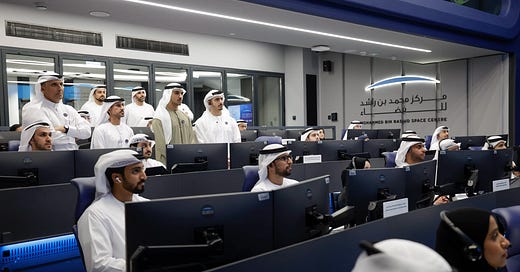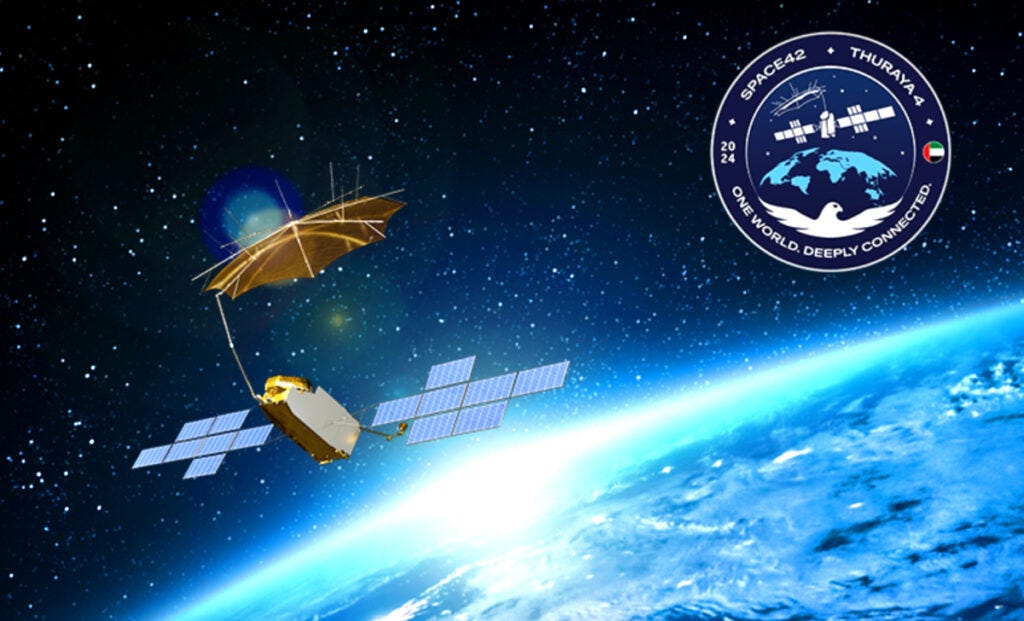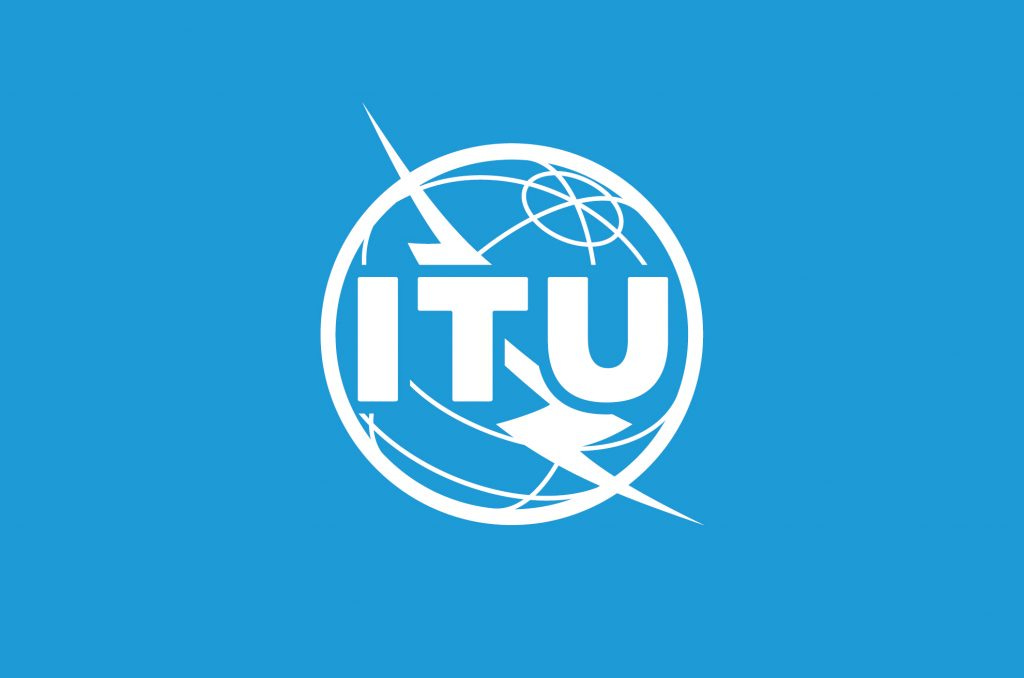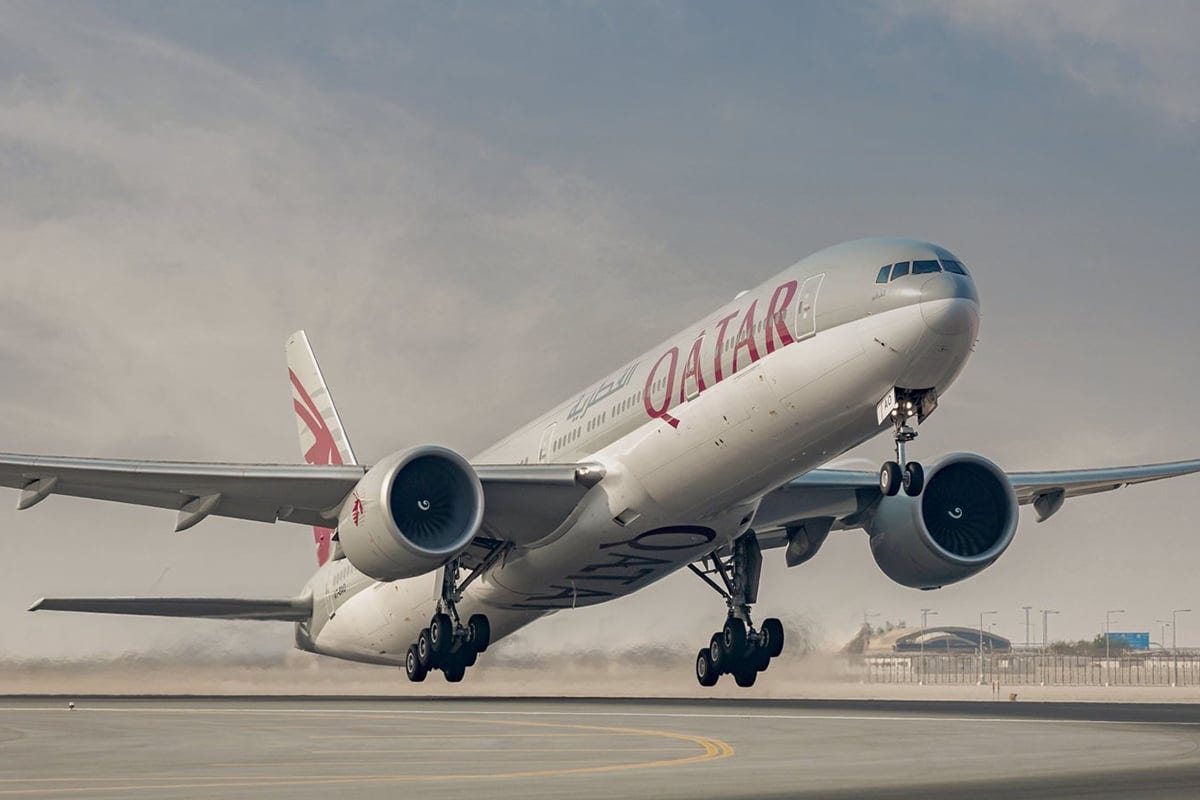Middle East Space Roundup: 13 to 19 January 2025
A summary of all the space news in the Greater Middle East over the past week, brought to you by AzurX
The following are the major space developments in the Greater Middle East region tracked by Middle East Space Monitor over the past week:
UAE Space Developments
Official: MBZ-SAT Launch a “Transformative Milestone” for UAE Space Program
In Arab News, Abdulla Al Shehhi of the UAE Space Agency writes that the launch of the MBZ-SAT represents a transformative milestone in the UAE's ambitious space program, showcasing the country’s commitment to innovation, sustainability, and global leadership. Aligned with the UAE National Space Strategy 2030, the satellite underscores the country’s efforts to develop a world-class space industry, diversify its economy, and tackle global challenges such as climate change. Fully developed by Emirati engineers at the Mohammed Bin Rashid Space Centre (MBRSC), MBZ-SAT delivers twice the imaging accuracy of its predecessors, processes 10 times more data, and provides insights across critical sectors like urban planning, disaster management, and agriculture within two hours of data capture. With nearly 90% of its mechanical and electronic components produced locally in collaboration with UAE-based firms, the project highlights the integration of private and public sector investments, which have surged to $11 billion and now include a 3 billion Dirham National Space Fund. Building on past successes like the Hope Probe, MBZ-SAT embodies the UAE’s vision of establishing a self-reliant aerospace ecosystem, inspiring future generations, and asserting its leadership in the global space community as part of its broader knowledge-driven growth strategy.
UAE’s MBZ-SAT Earth Observation Satellite Successfully Launched by SpaceX
The UAE’s Mohammed Bin Rashid Space Centre (MBRSC) has successfully launched MBZ-SAT, the region's most advanced Earth observation satellite, aboard SpaceX’s Falcon 9 rocket. Fully developed by Emirati engineers, MBZ-SAT represents a major milestone in the UAE’s space ambitions, boasting cutting-edge features such as a high-resolution imaging system, advanced electric jet propulsion, and precise navigation capabilities. These enhancements enable double the imaging precision and a tenfold increase in image generation capacity, supporting applications in environmental monitoring, infrastructure management, and disaster relief. Built with significant contributions from UAE companies, including Strata and Rockford Xellerix, the project reflects the country's focus on fostering local expertise and economic growth in the space sector. MBZ-SAT will be managed by MBRSC’s Mission Control Centre, showcasing the UAE’s commitment to becoming a global leader in space technology and innovation, aligned with its strategic vision of sustainable development and technological advancement. MBZ-SAT transmitted its first signal back to MBRSC mission control late on 15 January 2025 confirming that the satellite was operating optimally.
UAE’s AlAinSat-1 and Student-Built HCT-SAT-1 Launched Alongside MBZ-SAT
The launch of HCT-SAT-1, the first CubeSat built by students of the Higher Colleges of Technology (HCT) in collaboration with the Mohammed Bin Rashid Space Centre (MBRSC), marks a significant milestone for the UAE’s space sector. Launched alongside MBZ-SAT on SpaceX’s Falcon 9 rocket, this 1U CubeSat is an Earth observation satellite with a 5-megapixel payload camera and dimensions of 10x10x11.35 cm. The project engaged 34 students and nine faculty members across multiple disciplines, providing hands-on experience in satellite design, assembly, and testing. Supported by MBRSC mentors, the initiative emphasizes applied education and aligns with the UAE’s vision to cultivate Emirati talent in space science and technology. Also launched alongside MBZ-SAT and HCT-SAT-1 is AlAinSat-1, a 3U CubeSat built by the UAE’s National Space Science and Technology Centre (NSSTC) in Al Ain, an oasis city in the UAE. AlAinSat-1 is a remote sensing satellite built by students in the UAE, as well as with contributions from students in Spain, Indonesia, and Japan.
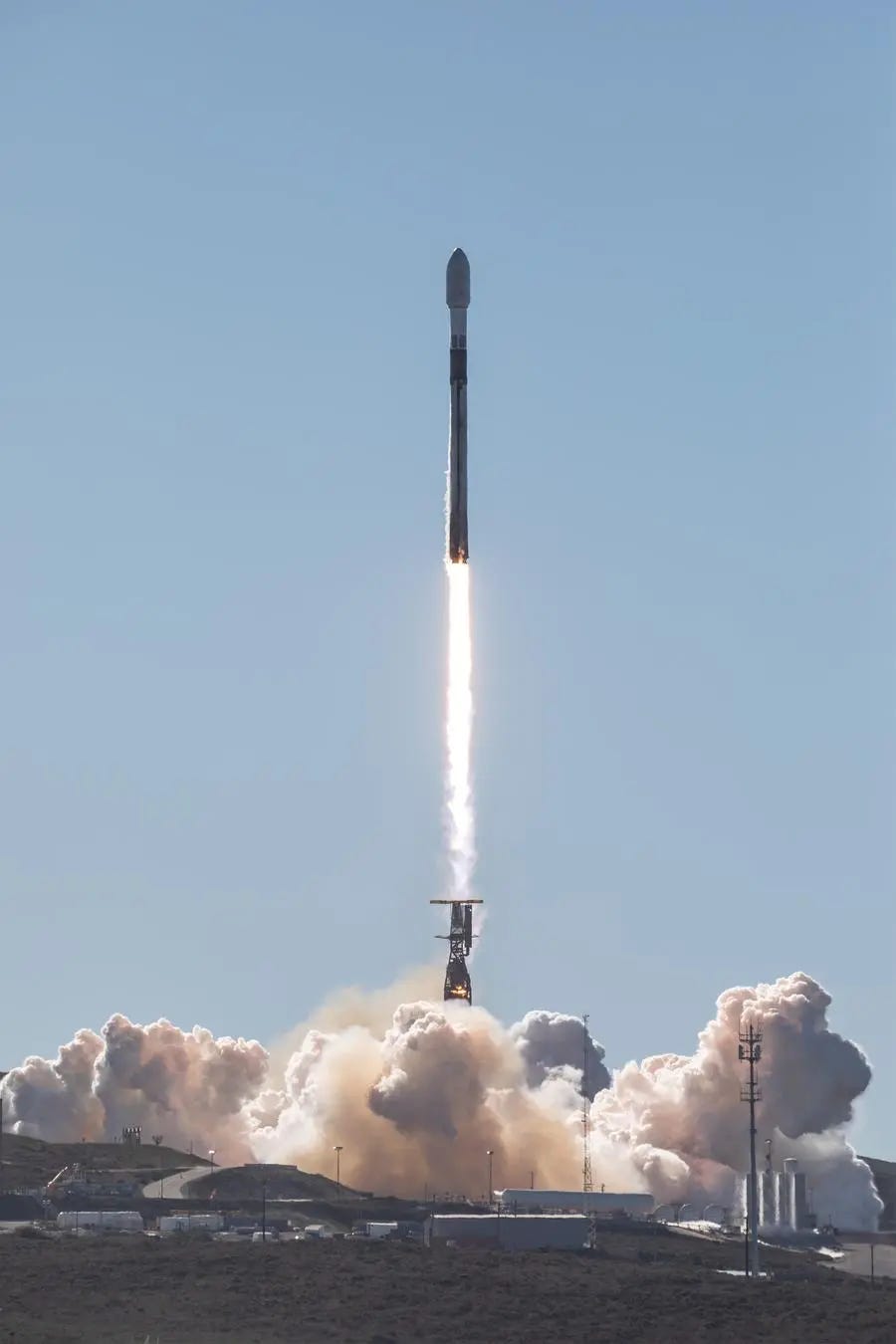
UAE’s Foresight-2 SAR Satellite Launched for Space42 by SpaceX
Space42, the UAE’s leading commercial satellite operator and geospatial company, successfully deployed the second phase of its Foresight satellite constellation in partnership with Finland’s ICEYE, a leader in synthetic aperture radar (SAR) technology, as part of SpaceX’s Transporter-12 mission on 14 January 2025. The advanced SAR satellites provide high-resolution, all-weather Earth observation capabilities to support disaster mitigation, maritime surveillance, and urban planning, reinforcing the UAE’s Earth Observation Space Program. This expansion strengthens Space42’s geospatial insights, enhances its multi-orbit satellite operations, and aligns with the UAE’s National Space Strategy 2030. The collaboration with ICEYE includes plans to assemble SAR satellites locally, positioning the UAE as a global leader in satellite-based Earth observation while fostering innovation and national satellite development expertise.
UAE’s Space42 Plans to Develop LEO Satellite Communications Constellation
Space42, the UAE’s premier commercial satellite operations and geospatial processing and analytics company, is positioning itself as a global leader in non-terrestrial connectivity by leveraging its Thuraya satellite fleet. Following the 3 January 2024 launch of Thuraya-4, now en-route to its orbital slot at 44° East, the company is set to replace the aging Thuraya-2 and expand its offerings with direct-to-device (D2D) and Internet of Things (IoT) services. Supported by a 15-year, $800 million commitment from the UAE government, Space42 plans to launch a low-Earth orbit (LEO) constellation to complement its geostationary assets. Thuraya-4, with a $799 million backlog, will enable the company to initially provide text and short-message services using its allocated 20 MHz spectrum, with cautious yet strategic entry into the D2D market. Space42 aims to capitalize on the growing demand for satellite-enabled connectivity while solidifying its role in the evolving global space economy.
UAE and Japan Advance Deeper Space Cooperation After Ministerial Meeting
Dr. Sultan Ahmed Al Jaber, UAE Minister of Industry and Advanced Technology, and Muto Yoji, Japan’s Minister of Economy, Trade and Industry, are advancing bilateral cooperation in the space sector under a forthcoming Memorandum of Cooperation (MoC) expected to be signed within a year. This initiative builds on the Comprehensive Strategic Partnership signed in 2022 and the outcomes of the UAE-Japan Space Public-Private Workshop held during the Abu Dhabi Space Debate in December 2024. The collaboration aligns with the UAE Space Agency’s Space Economic Zones program, designed to foster innovation, support local companies, and commercialize space technologies to build a sustainable knowledge economy. Both countries aim to develop a joint roadmap for the space industry, organize implementation-focused seminars, and strengthen their positions in the global space economy through this strategic partnership.
Analyst: UAE Positioning Itself as Major Hub in Global Space Economy
The UAE is strategically positioning itself as a prominent player in the global space economy, writes Chris Hamill-Stewart in Arab Gulf Business Insight, by leveraging its growing investments, neutral geopolitical stance, and government support to foster innovation and commercial success. Following the setback of the Rashid-1 rover’s lunar crash, the UAE is refocusing efforts through initiatives like hosting International Moon Day 2025 and establishing the Moon Village Centre in Abu Dhabi, highlighting its commitment to advancing the lunar economy. The country’s space ambitions are supported by significant investments, including a $5.1 billion satellite contract with Space42 and a partnership with SpaceX for the Thuraya-4 launch. Analysts project robust growth in the space economy, particularly in satellite communications, which is expected to increase from $47 billion in 2024 to $160 billion annually by 2032, presenting significant ROI potential for the UAE. Industry leaders emphasize the increasing demand for space-enabled technologies such as Earth observation and the Internet of Things (IoT), driven by advancements in AI and data solutions. With strong policy incentives and capital access, the UAE offers a fertile environment for space startups like Stellaria, which capitalize on the country’s neutral geopolitical positioning to foster international collaborations and innovative applications in sectors like agriculture, oil and gas, and smart cities. The UAE’s focused strategy and investment are set to establish it as a key influencer in the rapidly evolving space economy.
UAE’s Orbitworks Appoints Senior Executives
Orbitworks, the UAE joint venture between Marlan Space and Loft Orbital, has strengthened its leadership team with the appointment of Raoul d’Hérouville as Chief Operating Officer (COO) and Mohamed Ahmad Al Karbi as Satellite AIT and Operations Manager. Raoul brings extensive experience from Airbus and OneWeb, where he led transformative initiatives in satellite manufacturing, including industrializing production processes and overseeing the creation of one of the world’s first serial satellite manufacturing facilities. Under his leadership, over 700 satellites were successfully produced, highlighting his expertise in scaling operations and driving innovation. Mohamed, with nearly seven years in the space sector, has played a pivotal role in advancing the UAE’s space ambitions, contributing to satellite testing infrastructure and serving as a Board Member of the UAE Space Agency. His technical precision and leadership bolster Orbitworks’ capacity to deliver high-performance satellite solutions. These appointments reflect Orbitworks’ commitment to innovation and excellence, positioning the company for continued growth and leadership in the space industry.
France Appoints New Space Attache to Embassy in UAE
The French embassy in Abu Dhabi has appointed a new space advisor, Christelle Astorg-Lepine, to develop bilateral cooperation in the sector. The deep-pocketed UAE has grand plans for its space industry and numerous players are eager to seize those emerging opportunities, including France. Astorg-Lepine, a senior official in France’s Centre national d'études spatiales (CNES) who takes up her position in Abu Dhabi at the end of January 2025, replaces Donato Giorgi who departed the UAE in September 2024.
Türkiye Space News
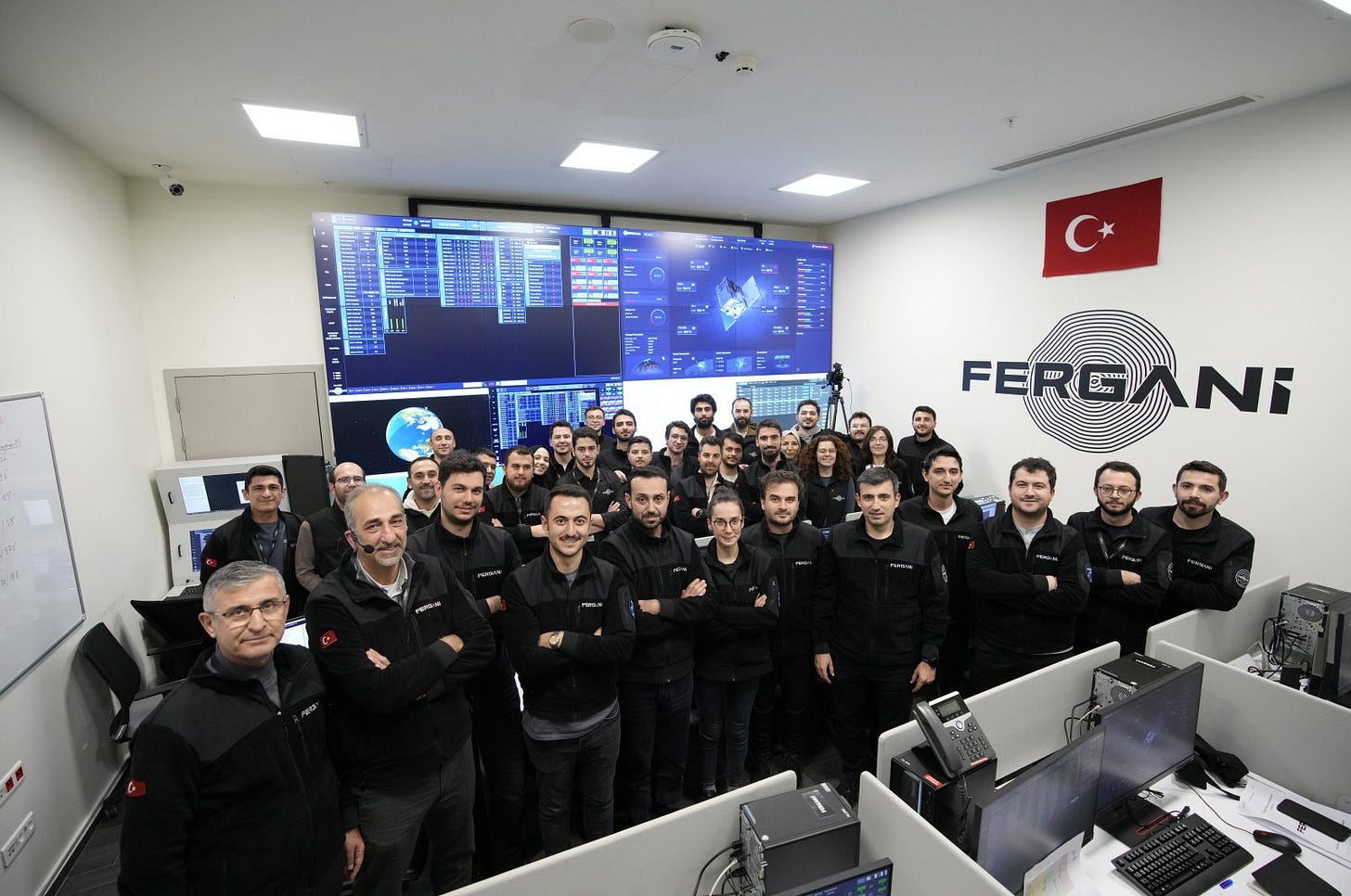
Türkiye’s Fergani Space Launches First Satellite for GNSS Constellation With SpaceX
Turkish space firm Fergani Space, founded by Baykar Chair Selçuk Bayraktar, successfully launched its first satellite, FGN-100-d1, aboard SpaceX’s Falcon 9 Transporter-12 mission. The satellite, developed entirely with Fergani’s resources, represents a milestone for Türkiye as the largest satellite built by a private Turkish company, marking the company’s entry into the Small Geostationary Satellite (SGEO) category. Positioned in low-Earth orbit at 500 kilometers, FGN-100-d1 is part of Fergani’s ambitious plan to deploy 100 satellites within five years to establish the Uluğ Bey global positioning system, offering advanced communication and geo-positioning capabilities. The launch underscores Türkiye’s growing space sector and aligns with its National Space Program goals, strengthening the country’s presence in the global space industry. Industry and Technology Minister Mehmet Fatih Kacır commended Fergani Space for its contributions to Türkiye’s expanding space ecosystem.
Four Satellites for Türkiye’s Plan-S Connecta IoT Network Launched by SpaceX
Türkiye's Plan-S successfully launched its four Connecta IoT Network satellites aboard SpaceX's Falcon 9 Transporter-12 mission, marking a significant advancement in its satellite Internet of Things (IoT) capabilities. Initial telemetry data confirms all satellites are in excellent health and functioning as planned. Now in the commissioning phase, these low-power, cost-effective satellites will enhance Plan-S’s network by offering broader coverage and shorter revisit times, positioning the company to deliver improved IoT services on a global scale. This milestone underscores Plan-S's growing presence in the satellite IoT sector, with nine satellites now in orbit, and its commitment to advancing innovative, scalable connectivity solutions. The launch underscores Türkiye’s growing space sector and aligns with its National Space Program goals, strengthening the country’s presence in the global space industry. Industry and Technology Minister Mehmet Fatih Kacır commended Plan-S for its contributions to Türkiye’s expanding space ecosystem.
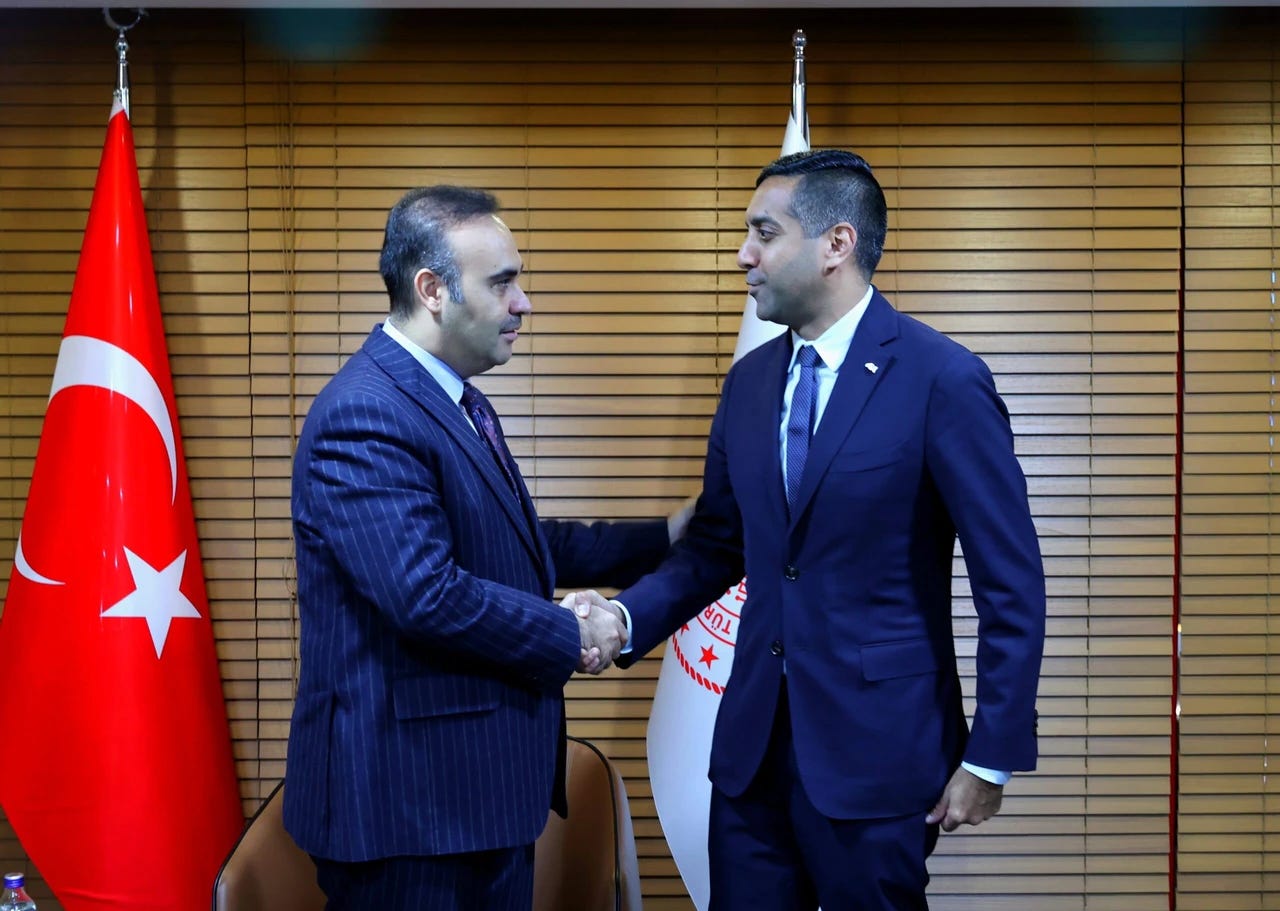
Türkiye to Co-Produce Modules for Axiom Space Station
The Turkish Space Agency (TUA) and Axiom Space have signed a memorandum of understanding (MoU) to strengthen Türkiye’s integration into global space initiatives, including contributing to the Axiom Space Station as the International Space Station (ISS) nears retirement by 2030. The partnership encompasses diverse fields such as aerospace, advanced manufacturing, space materials, and communications, with plans for the co-production of space station modules in Türkiye. The collaboration aims to establish research laboratories, microgravity manufacturing facilities, and astronaut training platforms, positioning Türkiye as a key player in the $1 trillion global space economy. Minister Mehmet Fatih Kacir and TUA President Yusuf Kirac highlighted the agreement’s role in inspiring youth and advancing technological innovation, while Axiom Space’s Tejpaul Bhatia underscored Türkiye’s growing contributions to human space exploration and its potential to drive global space ecosystem growth. This milestone partnership reflects Türkiye’s ambitions to expand its presence in space while fostering education, innovation, and international collaboration.
Türkiye's İTÜ Space Systems Design and Test Laboratory Aids Pakistan for PauSat-1 Earth Observation CubeSat
Pakistan's first Earth observation CubeSat, PauSat-1, has been successfully launched by SpaceX, marking a significant milestone in Pakistan's space exploration and international collaboration. Developed jointly by Pakistan’s Air University and Türkiye's İTÜ Space Systems Design and Test Laboratory (SSDTL), PauSat-1 features a high-resolution multispectral imager and operates in low-Earth orbit (LEO). With a 16U size, it is the largest and most advanced CubeSat ever produced by SSDTL, which leveraged its extensive experience from seven prior CubeSat missions. This partnership highlights Pakistan’s growing capacity for technological innovation and SSDTL’s leadership in advancing small satellite technology, showcasing the potential of international cooperation in space exploration.
Minister: Türkiye’s Türksat-6A Becomes Operational in February 2025
Türkiye’s first domestically produced satellite, Türksat-6A, has reached its permanent orbit and is set to become fully operational in February 2025, marking a significant milestone in the country’s satellite communications capabilities. The satellite will expand Türksat’s coverage to regions including India, Thailand, Malaysia, and Indonesia, reaching up to 5 billion people. It will enhance secure civilian and military communications and television broadcasting, while providing redundancy for existing satellites. According to Türkiye’s Minister of Transportation and Infrastructure, Abdulkadir Uraloglu, the satellite represents a critical step in advancing the nation’s technological independence and global connectivity.
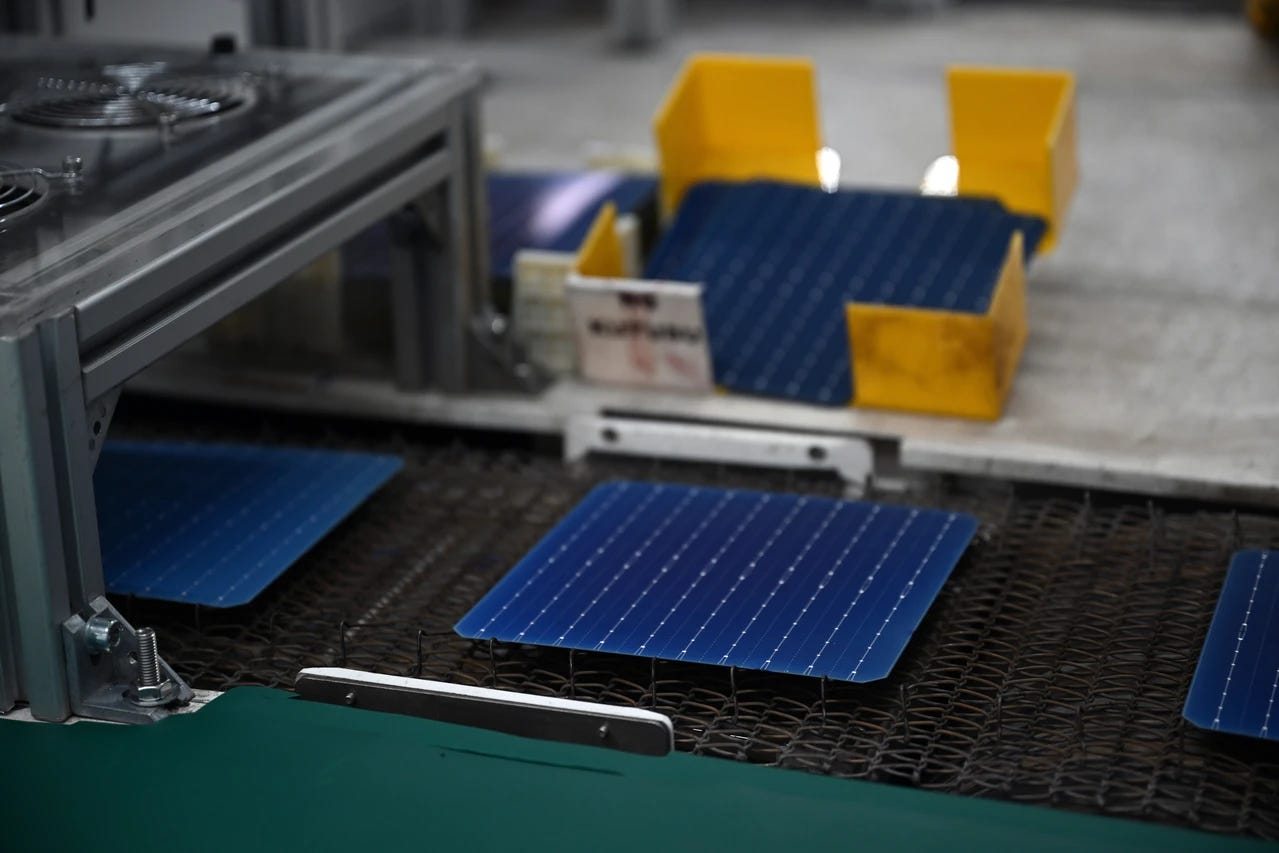
Türkiye’s Kalyon PV Providing Solar Cells for U.S. Satellites
Türkiye-based Kalyon PV has made significant inroads into the U.S. space industry by producing custom solar cells for satellites, reflecting its growing influence in advanced solar technologies. With a $350 million state-of-the-art manufacturing facility, Kalyon PV utilizes up to 90% local materials and boasts an annual production capacity of 2,000 megawatts. Since its establishment in 2020, the company has invested $40 million in R&D, employing over 100 researchers to drive innovation in renewable energy solutions. In addition to supporting Türkiye’s energy sector with projects like the Konya Karapinar Solar Power Plant, Kalyon PV has expanded its global footprint, exporting 25 megawatts of solar panels to the U.S. in 2022 and targeting further growth in the U.S. and European markets. CEO Ihsan Kulali emphasized the company's focus on high-value-added products, tailored solutions, and sustainability, cementing its role as a key player in renewable energy and aerospace applications.
Iran Space Developments
Lunapolitics: Iran to Develop a Lunar Rover
Iran’s space agency has unveiled its first major lunar rover project, marking a strategic move to position the country among leading spacefaring nations engaged in space exploration. Iran’s space agency head Hassan Salarieh emphasized the growing importance of planetary exploration as countries like China and India advance their lunar and interplanetary ambitions. The initiative aligns with Iran’s broader space strategy, which includes satellite development, bio-space projects, and human spaceflight, supported by the Chabahar spaceport. Salarieh underscored the multi-trillion-dollar potential of exploiting lunar, Martian, and asteroid resources, while advocating for international collaboration to overcome the high costs and technical complexities of space exploration. Iran’s efforts to enhance its technical and financial foundations include partnerships with universities, the development of orbital transfer blocks, and advanced bio-capsules, following a successful 2023 launch. The project reflects Iran's commitment to becoming a key player in the global space economy and underscores the risks of delaying investment in this high-stakes domain.
Analyst: Iran and Russia Deepening Space Ties for Commercial and Defense Purposes
Writing for the Stimson Center, a U.S. think tank, Emil Avdaliani explains that Russia and Iran are deepening their military-space collaboration, with Tehran leveraging Moscow's isolation from the West to access advanced space and military technologies. This strategic alignment, underpinned by decades of cooperation, includes satellite launches, shared infrastructure, and joint development projects. Notable milestones include the Omar Khayyam Earth observation satellite launch in 2022, memorandums with Iranian companies SAHAB and SpaceOmid, and recent Iranian satellite deployments from Russian facilities. Iran’s ambitions extend to building a regional spaceport in Chabahar and launching a crewed mission by 2028, efforts likely reliant on Russian expertise. These initiatives are intertwined with Iran’s broader geopolitical aims, including reducing dependency on Western-controlled systems like GPS by developing its own satellite navigation network. While international criticism views these projects through a security lens, Iran sees them as crucial for achieving technological independence and countering vulnerabilities. For Russia, the partnership offers a valuable ally amid its geopolitical isolation, underscoring the mutual benefits of this growing space cooperation. Iran and Russia signed a comprehensive strategic partnership agreement on 17 January 2025 that includes provisions for deep cooperation in space.
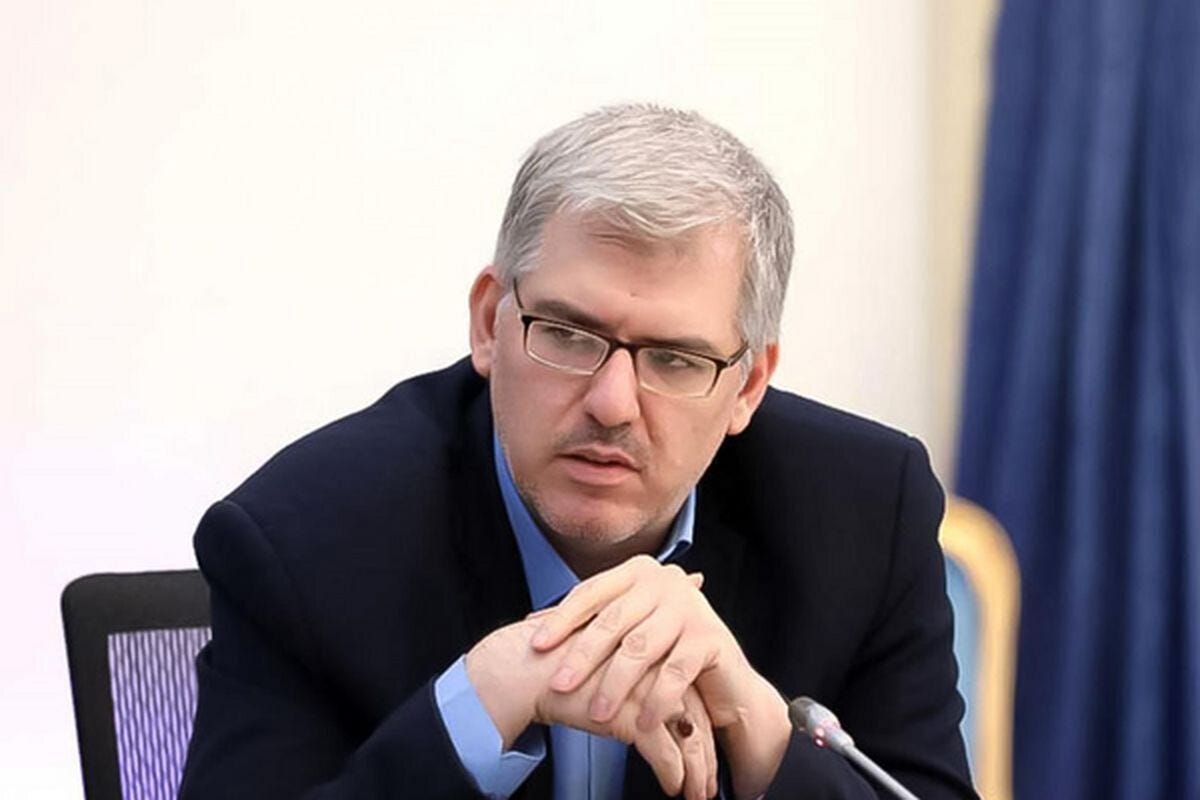
Iran to Launch Zafar-2 and Paya Satellites in Mid-June 2025
Iran plans to launch two new satellites, Zafar-2 and Paya, into orbit in mid-June 2025, following a delay from their initially scheduled January 2025 launch. Hassan Salariyeh, head of the Iranian Space Agency, announced the upcoming launches and highlighted additional projects to be unveiled during the February Fajr celebrations, marking the anniversary of the 1979 Islamic Revolution. Iran’s satellite development pipeline includes the Pars-3 satellite, currently under construction with an imaging accuracy of two meters, and the Nahid-1 and Nahid-2 satellites, equipped with Q-bandwidth capabilities, which are slated for deployment soon. These advancements underline Iran's commitment to strengthening its space capabilities and positioning itself as a competitive player in satellite technology.
Iran to Start Launch Internet of Things Constellation in March 2025
Iran is advancing its space ambitions with plans to launch the Shahid Soleimani satellite constellation in late March 2025, according to Hassan Salarieh, head of the Iranian Space Agency. The 20-satellite constellation, designed to enhance Internet of Things (IoT) applications, reflects Iran's broader push to expand its space capabilities. Other upcoming launches include the Nahid-2 and Nahid-3 satellites, alongside radar and advanced Pars series satellites, while the upgraded Pars-1 will debut during February’s Fajr Decade celebrations. Salarieh highlighted the critical role of universities in satellite development, both as centers of innovation and talent cultivation, with many satellites and space technologies originating from academic collaborations. The Mehda telecommunications satellite, operational since February 2023, exemplifies Iran's growing satellite portfolio. These initiatives, supported by partnerships with knowledge-based companies and government science agencies, aim to bolster Iran’s technical expertise and position in the global space industry, despite challenges posed by aging satellites and the need for rigorous in-orbit testing of new technologies.
ITU Struggles to Curb Starlink Operations in Iran
The International Telecommunications Union (ITU) is grappling with enforcement challenges in two critical areas: space debris regulation and unauthorized satellite usage, including deliberate signal jamming. A significant issue involves SpaceX's Starlink operations in Iran, where the service is not authorized, prompting complaints from Iran to the ITU for over two years. Despite ITU pressure on licensing authorities in the U.S. and Norway to intervene, progress has stalled, with the ITU's Radio Regulations Board expressing frustration over the lack of solutions. Another unresolved issue involves Russia’s deliberate jamming of permitted transmissions from Ukraine via Eutelsat and SES satellites, despite ITU efforts to engage France and Sweden in addressing the interference. The ITU has called for satellite operators to act when unauthorized transmissions occur, but disputes over enforcement and jurisdiction persist. These challenges underscore the ITU's struggle to ensure compliance with its regulations in the face of geopolitical and technological complexities.
Saudi Arabia Space News
CEO of Saudi Arabia’s Neo Space Group Outlines Plans for 2025
Martijn Blanken, CEO of Neo Space Group (NSG), highlighted the company’s strategic growth plans and the pivotal role of Saudi Arabia’s Public Investment Fund (PIF) in shaping the global commercial space sector during a discussion with Jason Rainbow of Space News. Established by PIF in 2024, NSG pursues a multi-faceted strategy combining acquisitions, partnerships, and organic development across geospatial services, satellite communications, navigation, and the Internet of Things (IoT). Initially leasing satellite capacity with plans to develop proprietary constellations, NSG leverages PIF’s capital to drive innovation and expand its global presence while maintaining a strong regional focus. The company emphasizes workforce development through partnerships with Saudi universities and local talent recruitment, reinforcing its commitment to advancing Saudi Arabia’s space sector and global competitiveness.
Saudi Arabia’s NSG Appoints SATCOM Veteran Mark Dickinson as CTO
Neo Space Group (NSG), Saudi Arabia's leading commercial space services provider and a PIF company, has appointed Dr. Mark Dickinson as Chief Technology Officer (CTO) to drive technological innovation and bolster its position in the global space industry. With over 25 years of experience in satellite communications and leadership roles at Inmarsat and Viasat, Dickinson brings a track record of managing multi-billion-dollar satellite programs, pioneering software-defined satellite technologies, and championing sustainable space operations. Under his leadership, NSG aims to expand its capabilities in satellite communications, geospatial services, and Positioning, Navigation, and Timing (PNT) solutions while advancing investments in cutting-edge technologies. Since its inception in May 2024, NSG has achieved significant milestones, including high-speed In-Flight Connectivity (IFC) solutions, strategic acquisitions, and collaborations with industry leaders and academic institutions. Dickinson’s appointment signals NSG's commitment to shaping Saudi Arabia's leadership in space technology through innovation, strategic partnerships, and the development of local expertise, further solidifying its position as a key enabler in the global space economy.
Saudi Arabia’s Ma’aden and Tahreez Partner With Fleet Space for Mining Applications
Fleet Space Technologies, an Australian satellite company, has partnered with Tahreez and Saudi Arabian Mining Company Ma’aden to accelerate mineral resource discovery in Saudi Arabia using advanced space and AI-driven technologies. The memorandum of understanding (MoU) focuses on deploying Fleet Space's ExoSphere technology, which combines satellite connectivity, remote geophysical data acquisition, and real-time AI-powered 3D subsurface imaging. This collaboration aims to unlock the mineral exploration potential of the Arabian-Nubian Shield, aligning with Saudi Arabia's Vision 2030. A regional task force will facilitate the rapid deployment of ExoSphere across Ma’aden’s projects, enhancing drilling precision and efficiency. Ma’aden CEO Bob Wilt emphasized the initiative as central to Saudi Arabia's strategy to lead mining innovation and strengthen its role in the global mineral value chain. Fleet Space CEO Flavia Tata Nardini highlighted the transformative impact of real-time, AI-powered insights in optimizing drilling campaigns and driving the future of mining.
Saudi Arabia’s Juffali Group Partners With SEALSQ & WISeKey for Quantum-Secured WISeSat.Space Solution
Switzerland’s SEALSQ Corp., in collaboration with WISeKey International Holding and Saudi Arabia’s Juffali Group through their joint venture WISeKey Arabia, is advancing Saudi Arabia’s digital transformation and cybersecurity objectives under Vision 2030. A key focus of this expansion is the deployment of WISeSat.Space, a low-power satellite solution designed for real-time Internet of Things (IoT) data processing in remote areas. With quantum-resistant encryption, WISeSat.Space ensures end-to-end security for critical data while reducing barriers to satellite communications, enabling applications such as environmental monitoring, smart cities, and supply chain optimization. These satellite initiatives complement SEALSQ's broader efforts to support the Kingdom’s innovation ecosystem, including partnerships with Hedera and the $250M DeepTech Venture Studio, which fosters startups in blockchain, AI, IoT, and quantum technologies. By integrating advanced satellite solutions into its strategy, SEALSQ aligns with Vision 2030's goals of fostering innovation, enabling secure digital transformation, and driving economic diversification in Saudi Arabia.
Arabsat and ZainTECH Partner to Revolutionize MENA Digital Connectivity
Arabsat, the regional satellite communications operator headquartered in Saudi Arabia, and the UAE’s ZainTECH have announced a strategic partnership to revolutionize digital connectivity across the Middle East and North Africa (MENA) region, leveraging Arabsat's extensive satellite network and ZainTECH's secure, managed cloud infrastructure. This collaboration aims to deliver scalable and reliable digital solutions that integrate cutting-edge technologies, including the Internet of Things (IoT), AI, drones, and advanced data services, enabling businesses to access these tools even in remote locations. By combining their expertise, the two companies are accelerating digital transformation efforts, fostering innovation, and shaping a more connected and technologically advanced future for the region.
Israel Space Developments
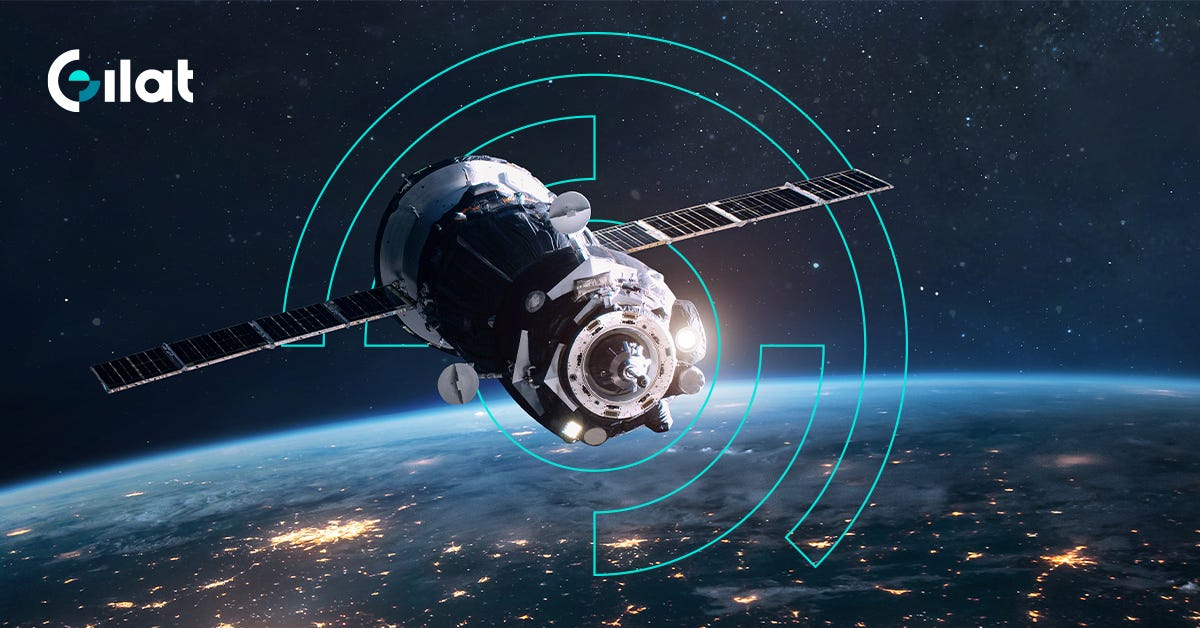
Israel’s Gilat Secures $3 Million From Service Providers for SATCOM Power Amplifiers
Israel’s Gilat Satellite Networks Ltd., a global leader in satellite networking technology, has secured over $3 million in orders from leading service providers for its high-performance Gateway Solid State Power Amplifiers (SSPAs). These critical components, designed for low-Earth orbit (LEO) constellations, exemplify Gilat's commitment to delivering energy-efficient, high-power, and lightweight solutions that meet the rigorous demands of modern satellite networks. The orders, to be fulfilled over the next 12 months, reinforce industry confidence in Gilat’s innovative technology as LEO constellations gain traction for enabling seamless global connectivity. Edgar Khachatryan, President and General Manager of Gilat Wavestream, emphasized the company's pivotal role in powering next-generation satellite networks and supporting service providers in meeting escalating demand for reliable, high-performance global communication.
IAI Executive: AI Transforms Potential of Earth Observation Data
Inbal Kreiss, Head of Innovation at Israel Aerospace Industries (IAI), emphasized the transformative potential of AI in space and defense systems during her address at the Tech TLV conference. Highlighting the integration of advanced analytical engines into defense and navigation systems, Kreiss described AI as a catalyst for enhancing the performance of systems reliant on vast amounts of big data collected from space. She noted that AI-driven machine vision and data analysis have revolutionized capabilities across domains, enabling precise object identification, environmental monitoring, and resource discovery. Applications range from identifying vessels in maritime security to detecting ocean pollution and agricultural minerals, showcasing AI's ability to improve both military and civilian systems. Kreiss also underscored the importance of fostering innovation through global collaboration, accelerator programs, and partnerships with academic institutions, highlighting IAI’s hybrid accelerator initiative, which has resulted in 16 patents over 15 cycles. This approach positions IAI as a leader in leveraging AI to drive advancements in satellite technology and integrated systems.

Israel’s Phytech Partners With Rivulus for Satellite Data-Driven Agriculture
Israel’s ag-tech company Phytech has partnered with Rivulis, a global leader in precision irrigation, to advance sustainable agriculture through data-driven solutions. Phytech's platform integrates Internet of Things (IoT) sensors, predictive algorithms, and real-time data from fields, monitoring crop water and nutrient needs while optimizing irrigation and fertilization. Serving over 1,000 growers across 18,000 farms globally, including 30% of the world’s almond production, Phytech processes 25 million daily data points, leading to 25% resource savings and an 8% yield increase annually. A key aspect of the collaboration is the integration of Rivulis’s Manna platform, which utilizes real-time satellite imagery for monitoring and tailored irrigation recommendations. This synergy combines Phytech’s cutting-edge analytics with Rivulis’s reliable irrigation systems, offering farmers worldwide enhanced precision agriculture solutions. The partnership underscores the growing role of satellite and IoT technologies in addressing resource efficiency, boosting yields, and promoting global food security, solidifying Rivulis’s position as a leader in sustainable agriculture.
Israel’s Gilat Satellite Networks Ltd. is commended by U.S. telecommunications company Southern Linc for its response to the demand for emergency SATCOM in the aftermath of Hurricane Helene.
Other Regional Space News
Analysts: Middle East’s Space Transformation Saw 175% Increase in Satellite Launches Between 2018 and 2023
The global space economy is undergoing a transformative shift as Asia and the Middle East emerge as significant players alongside traditional leaders like the U.S., Russia, and Europe. Both regions are investing heavily in satellite services, Earth observation, and space exploration to address domestic needs and capitalize on opportunities in telecommunications, agriculture, and disaster management. Asia’s satellite launches increased by 70% between 2018 and 2023, while the Middle East saw a 175% rise, driven by strategic objectives to foster innovation and diversify economies. The UAE leads the Middle East’s space ambitions with achievements like the Hope Probe to Mars and the first Arab spacewalk, supported by its advanced space infrastructure. Saudi Arabia, under Vision 2030, has made strides in human spaceflight and satellite technology, while countries like Oman, Egypt, and Bahrain are building foundational capabilities, leveraging partnerships with global players like China. Sovereign wealth funds, including the UAE’s Mubadala and Saudi Arabia’s PIF, play a pivotal role in funding satellite communications, small satellite manufacturing, and space exploration initiatives. Key growth areas include reusable rockets, small satellite production, satellite constellations, and resource utilization missions, presenting significant opportunities for global partnerships. This evolving landscape fosters innovation and inclusivity, promising to reshape the future of space exploration and deliver impactful solutions to global challenges.
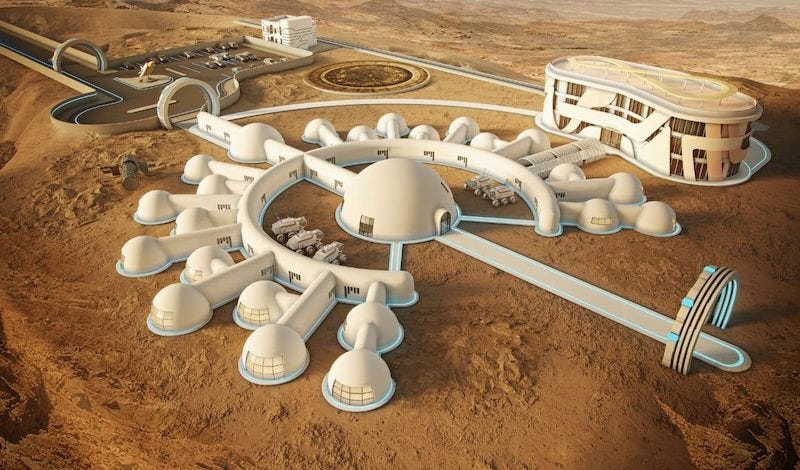
Oman Starts Construction of Zone 88 Space Special Economic Zone in Duqm
Oman has commenced construction of Zone 88, its first dedicated scientific and economic zone for space industries and advanced technologies, located in the Special Economic Zone in Duqm. Now 25% complete, the project encompasses a space habitat center, commercial satellite launch platform, unmanned vehicle technology center, AI and advanced technology testing area, and a satellite ground station. The space habitat aims to simulate living conditions on Mars and the Moon, supporting astronaut training, scientific tourism, and regional sectoral needs. With the Middle East space economy valued at $25 billion in 2023 and projected to reach $75 billion by 2032, Zone 88 positions Oman as a regional hub for space innovation, aligning with the sector's 92% forecasted spending growth over the next decade. This initiative underscores Oman’s commitment to advancing space technologies and capturing opportunities within the rapidly expanding space economy.
Yemen and the Political Implications of Starlink
Writing for Sada, a blog hosted by the Carnegie Endowment for International Peace, analyst Muhammed Ali Thamer notes that the entry of Starlink into Yemen, the first country in the Middle East to gain full access to Elon Musk's satellite internet service, has ignited a polarized debate amidst the country’s ongoing conflict and fragile political environment. While the internationally recognized government (IRG) in Aden welcomes Starlink as a tool to counter Houthi-controlled internet services and enhance military communication security—drawing parallels to its impact in Ukraine—the Houthi authorities in Sana’a view it as a national security threat, accusing it of facilitating espionage and undermining sovereignty. This division reflects broader concerns over the politicization of telecommunications, potential U.S. influence in the region, and the control of information flows, with experts warning of possible militarization of the service. As Yemen grapples with these dynamics against a backdrop of economic collapse, unresolved political strife, and humanitarian crises, Starlink’s role in the conflict remains both an opportunity for connectivity and a contentious factor in the nation’s ongoing turmoil.
Teams from Egypt and UAE Awarded in 2024 NASA Space Apps Challenge
The 2024 NASA Space Apps Challenge, the world’s largest annual global hackathon, has recognized 10 global winners for their innovative solutions addressing real-world and space challenges using NASA’s open data. With over 93,000 participants from 163 countries and 9,996 project submissions, the event highlighted creativity in areas such as Earth observation, planetary seismology, and exoplanet exploration. Notable winners included the UAE-based Innovisionaries, who developed *Eco-Metropolis*, a sustainability-focused urban planning game, and Egypt’s TerraTales, a web app blending climate storytelling, AI forecasting, and interactive gaming. This year’s winners exemplify the hackathon’s mission to inspire collaboration and advance space and Earth sciences for the global good.
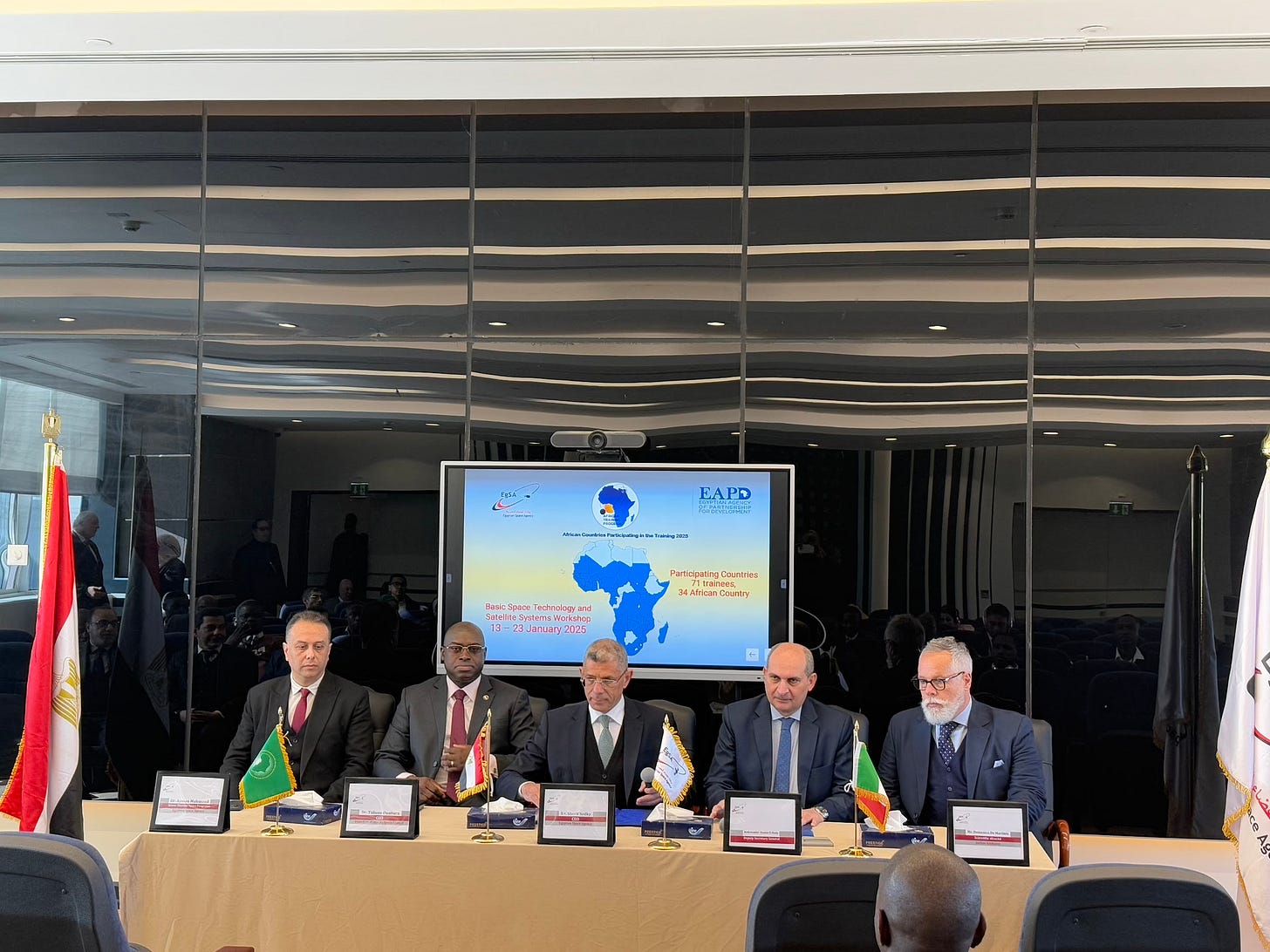
Egypt’s Space Agency Hosts African Engineers for AfDev-Sat Training Program
The Egyptian Space Agency (EgSA) has launched a comprehensive training program under the African Development Satellite Initiative (AfDev-Sat), hosting 21 engineers and specialists from 20 African countries. Running from 13 to 23 January 2025 the program focuses on building indigenous satellite technology capabilities through hands-on workshops covering satellite design, testing, and mission analysis. Supported by the Egyptian Agency for Partnership in Development (EAPD) and aligned with Egypt's leadership in regional space integration, this initiative leverages EgSA's advanced facilities to empower African countries. Since its inception in 2021, AfDev-Sat has trained 71 engineers from 34 African countries, fostering collaboration and self-reliance in the continent's burgeoning space sector. The program also highlights gender inclusion, with strong female representation among participants, and underscores Egypt’s commitment to driving African innovation and capacity building in space technology. This initiative supports Africa’s vision for enhanced regional collaboration and positions the continent as an emerging contributor to global space development.
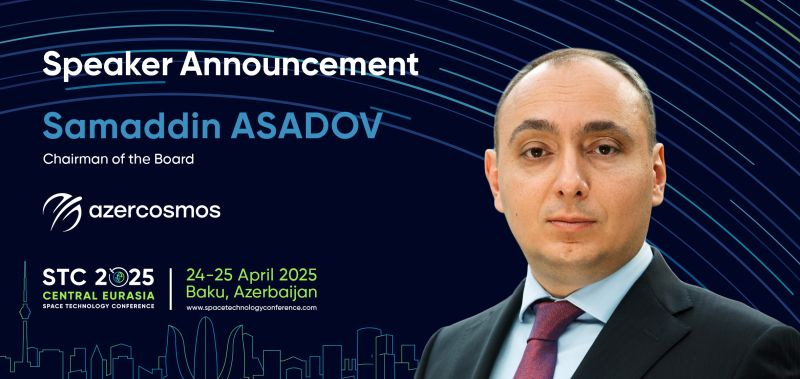
Azerbaijan’s Azercosmos to Host Space Technology Conference for Central Eurasian Space Sector
Samaddin Asadov, Chairman of Azerbaijan’s Azercosmos and Vice President for Science & Academic Relations at the International Astronautical Federation, will deliver the keynote address at the fourth edition of the Space Technology Conference (STC) in 2025, hosted by Azercosmos in Baku. Building on the success of STC 2024 in Ankara, the event will bring together national space agencies, satellite operators, and industry stakeholders from Central Eurasia, alongside the global space community. Discussions will center on the role of space and satellite technologies in fostering sustainable socio-economic development across the region, highlighting Baku’s strategic position as a hub for international collaboration in the space sector.
SpaceX Executive Praises Georgia’s Role, and Use of Starlink, in Trans-Caspian Trade Corridor
Stephen Nelson, Satellite Policy Director at SpaceX, highlighted Georgia’s strategic position as a bridge between Europe and Asia, emphasizing its growing importance as a transport and logistics hub along the Trans-Caspian trade corridor. Speaking at the Internet Governance Global Forum, Nelson praised Georgia’s innovative regulatory environment, with the Georgian National Communications Commission being the first in the Caucasus region to license Starlink's satellite internet services. This proactive approach has enabled high-speed, low-latency internet access, particularly benefiting remote mountainous villages previously underserved by traditional infrastructure. Nelson outlined Starlink’s plans for 2025, including the introduction of new business models and advancements such as improved spectrum efficiency, speeds of up to 1 Gb/s, and the concept of "digital corridors" to enhance connectivity and cross-border collaboration. These developments position Georgia as a key player in integrating next-generation technologies into its digital and logistical ecosystem.
Armenia’s Bazoomq Hosts Space Experts and Officials from the U.S.
Armenia’s Bazoomq Space Research Laboratory hosted U.S. space technology experts and representatives from the U.S. Embassy in Armenia, showcasing its advancements, including the development of its second satellite and the activities of the DeepSat startup. Discussions focused on Armenia's regulatory framework for space activities and the critical role of space law in ensuring compliance with international standards. The visit included a tour of the laboratory's facilities and ground station, culminating in an agreement to strengthen collaboration and maintain ongoing communication, reflecting growing international engagement in Armenia's emerging space sector.
Qatar Airways Surpasses Target of Equipping Fleet With SpaceX’s Starlink
Qatar Airways has surpassed its 2024 target by equipping 15 aircraft with SpaceX’s Starlink satellite internet, cementing its position as the largest global airline offering this high-speed service. The Doha-based carrier aims to complete Starlink installations across its Boeing 777 fleet by Q2 2025 and its Airbus A350 aircraft by summer 2025. Starlink provides gate-to-gate connectivity without requiring passenger login, delivering internet speeds comparable to home Wi-Fi. Offered free of charge, the service enhances passenger experience, particularly for business travelers, positioning Qatar Airways as a leader in in-flight connectivity. The airline recently demonstrated Starlink’s capabilities with a live press conference at 35,000 feet, showcasing its ability to support streaming, video calls, and online gaming. By adopting cutting-edge low-Earth orbit satellite technology, Qatar Airways is setting a new standard in aviation, emphasizing connectivity as a critical component of modern travel and maintaining its competitive edge in a recovering travel market.
Other regional space news in brief:
The U.S. Embassy in Tunis, Tunisia, has called for applications from young Tunisians to attend the U.S.-Tunisia Space Camp in Huntsville, Alabama, in July 2025. Candidates can apply here;
The CEO of Bahrain’s National Space Science Agency (NSSA) provided the keynote address at the launch of the AstroAid Foundation, a non-profit dedicated to providing satellite technologies to international healthcare;
DPS Modern Indian School in Qatar has inaugurated its first state-of-the-art Space and Robotics Lab, reflecting its commitment to advancing STEM education;
Azerbaijan’s Azercosmos confirmed that it will be participating in the 76th International Astronautical Congress (IAC) that will be held in Sydney, Australia, from 29 September to 3 October 2025;
Algeria and Slovenia held talks that strengthened their bilateral cooperation across a range of sectors, including space and satellite cooperation;
Be sure to catch up with space activities in the region in the next edition of Middle East Space Monitor’s space roundup!

